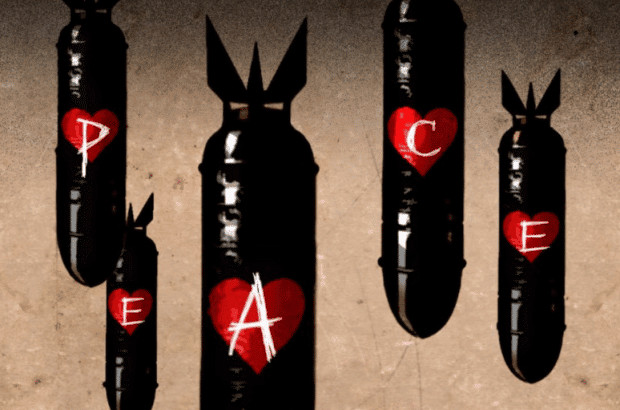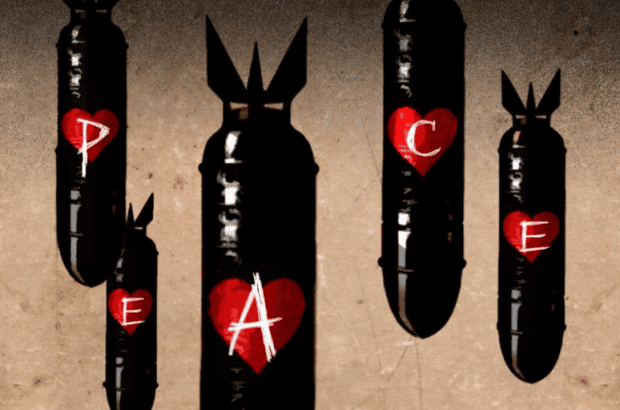
The following is a modified version of the speech I delivered at the Ron Paul Institute’s “Peace and Prosperity” conference in Virginia on September 10, 2016.
On the Fourth of July in 1821, John Quincy Adams delivered one of the most remarkable speeches in American history. The speech is entitled, “In Search of Monsters to Destroy.” In his speech, Adams described America’s founding principles on foreign policy. He pointed out that there are lots of bad, monstrous things that go on in the world — dictatorships, tyranny, famines, starvation, wars, discord, corruption, and the like. America, however, does not go abroad in search of such monsters and attempt to save people from them. Instead, Adams said, Americans would strive to build a model society of freedom, peace, prosperity, and harmony here at home for the world to emulate and also to serve as a sanctuary for people who flee such monsters.
Adams was building on the ideas and the philosophy of people like George Washington and Thomas Jefferson, who had spoken against America’s ever entering into alliances with other countries or being part of blocs to serve as counterweights to other blocs and against bearing enmity against particular nations.
America’s founding governmental structure did not permit it to go abroad and intervene in the affairs of other nations. The Constitution had called into existence a limited-government republic, one that had a basic military force but nothing like the enormous military-intelligence establishment that we have today. That’s because of the deep antipathy that our American ancestors had toward standing armies, which, they believed, posed a giant threat to the citizens of a nation, directly as well as indirectly through the incessant wars in which standing armies inevitably embroil a nation. As James Madison, the father of the Constitution had pointed out, of all the enemies to liberty, war is the biggest because it encompasses all the other ones, including centralization of power and ever-increasing debts and taxes.
Adams added an admonition in his speech. He said that if America were ever to abandon its non-interventionism foreign policy, she would become like a “dictatress” — that is, a government that would wield and exercise dictatorial powers, both at home and abroad, and that would begin behaving like a dictator. The point was clear: To remain free, America would have to keep a constitutionally limited-government republic. Abandoning that governmental structure would mean abandoning a free society.
Let’s jump ahead 140 years to the year 1961, when President Dwight Eisenhower delivered another remarkable, even shocking, speech. It was his Farewell Address after serving eight years as president. Ike pointed out that America’s federal governmental structure had undergone a fundamental, almost revolutionary, change. The federal government had been converted into a national-security state, which he called the “military-industrial complex,” which consisted primarily of the Pentagon, the CIA, the NSA, and the ever-growing multitudes of weapons producers and “defense” contractors who were feeding at the public trough.
Eisenhower, who had served as Supreme Allied Commander in World War II and, therefore, had a good understanding of militaries and military establishments, issued a stunning warning to the American people in his Farewell Address. He told them that the military-industrial complex posed a grave threat to the democratic processes and liberties of the American people.
How had this remarkable change in governmental structure come about?
At the end of World War II, US officials converted the Soviet Union, which had been America’s World War II partner and ally, into an official enemy of the United States. They maintained that an international communist conspiracy, based in Moscow, was planning to take over the United States. It was therefore necessary, they said, for America to “temporarily” become a national-security state in order to defeat the Soviet Union in a Cold War.
Why was the concert of a national-security state important? Because it is a type of governmental structure that characterizes dictatorships. The Soviet Union was a national-security state. Communist China is a national-security state. So is North Korea. So is Cuba. And so is the United States, post-World War II and continuing through today.
Here was the genesis of America’s foreign policy of regime change, which sometimes involved the destruction of democratic regimes. Iran. Guatemala, Cuba. Indonesia. Congo. Chile. And others.
Here was the genesis of America’s formal program of assassination. The CIA-Mafia partnership to murder Fidel Castro, whose army never attacked the United States or even threatened to do so. Also, the CIA’s partnership in Operation Condor, which might be the biggest international assassination program in history.
Here was the genesis of America’s formal program of torture. The CIA’s MKULTRA program, which involved medical experimentation on innocent and unsuspecting Americans.
In 1989, however, to the shock of the military-industrial complex and most everyone else, the Cold War suddenly and unexpectedly came to an end. There was one big problem, however. The national-security establishment, which had come into existence “temporarily” to fight the Cold War, declined to go out of existence or even to permit a major reduction in size. By this time, the military-industrial complex had become the most powerful and influential component of the federal government, one to which the other three branches of the government inevitably deferred.
It was soon after the Cold War ended that the national-security establishment went into the Middle East in search of monsters to destroy. There was the Persian Gulf War, which killed multitudes of Iraqi people, followed by the brutal sanctions on Iraq that contributed to the deaths of hundreds of thousands of Iraqi children. There was the infamous statement by US Ambassador to the United Nations, Madeleine Albright, who declared that the deaths of half-a-million Iraqi children from the sanctions was “worth it.” By “it,” she meant the efforts at achieving regime change in Iraq. There was also the stationing of US troops near Islamic holy lands. The no-fly zones over Iraq, which involved firing missiles that were killing even more Iraqis, including children. The unconditional support of the Israeli government and brutal authoritarian regimes in the region.
All that deadly interventionism, not surprisingly, was turning the Middle East into a boiling cauldron of anger and rage against the United States. Two high UN officials, Hans von Sponek and Denis Halliday, resigned their humanitarian positions to protest what they considered was the US government’s genocidal policy of sanctions against the Iraqi children.
The anger and rage manifested itself in 1993 with the terrorist attack on the World Trade Center, followed by the attacks on the USS Cole and the US embassies in East Africa, culminating in the 9/11 attacks.
Thus, when President Bush and other US officials maintained that the 9/11 attacks had been motivated by hatred for America’s freedom and values, they were lying. The truth was that the terrorists were motivated by the death and destruction that the US national-security establishment had been wreaking in the Middle East since the end of the Cold War.
That’s when US officials decided to use the 9/11 attacks to double down, with even more deadly and destructive interventionism. The invasion and occupation of Afghanistan, followed by the invasion and occupation of Iraq, which not only sacrificed US troops but also killed multitudes of people who had nothing to do with the 9/11 attacks. The more people they killed, the more people who would be filled with even more anger and rage. The invasions and occupations of Afghanistan and Iraq became the biggest terrorist-producing machine in history, and a perpetual one at that.
Not surprisingly, US officials used anti-American terrorism to suspend the rights and liberties of the American people. That’s why we now live in a country whose government wields the omnipotent power to assassinate any of us. And the omnipotent power to round up Americans, put them into concentration camps, and torture them, without due process of law and trial by jury. And the omnipotent power to spy on us, listen in on our telephone conversations, read our email, and monitor our Internet activity.
Those are the powers wielded by dictatorships, not limited-government republics. That’s what John Quincy Adams said would happen if America were ever to start going abroad in search of monsters to destroy. That’s why Eisenhower warned the American people about the ever-growing power and influence of the military-industrial complex. In the name of keeping us safe from the enemies its policies have produced, the national-security establishment has destroyed the freedom of the American people.
The national security state has not only destroyed our freedom, it is also destroying our prosperity. Every year the federal government is spending far in excess of what it receives in taxes. Federal spending is out of control, with the government’s debt mounting exponentially. The national-security state, with its ever-increasing spending, is heading our nation toward bankruptcy and a grave monetary and financial crisis.
Nonetheless, no one should be contemplating ingesting cyanide capsules. Ideas on liberty have consequences. They have the potential of bringing a monumental shift in society, toward what everyone at this conference wants: a free, peaceful, and prosperous society.
Several weeks ago, the Los Angeles Times published a remarkable op-ed by a professor at Texas A&M named Elizabeth Cobbs. It’s entitled “For US Foreign Policy, It’s Time to Look Again at the Founding Fathers’s ‘Great Rule.’” It’s a great article and I highly recommend it as a blueprint for getting America back on the right track.
Cobb pointed out a statistic that absolutely stunned me. She said that the Pew research organization conducted a poll this year in which 57 percent of Americans now believe that the United States should “mind its own business” and leave other countries to deal with their problems. That is up from 52 percent three years ago.
That is obviously a remarkable number. It reflects that an enormously large number of Americans are now subscribing to the non-interventionist, limited-government philosophy of John Quincy Adams, George Washington, Thomas Jefferson, and the other Founding Fathers. In fact, we might well be getting close to that critical mass of people needed to bring a gigantic paradigm shift in American society, one that moves us in the direction of a free, peaceful, and prosperous society.
And that is where all of you here at this conference come into play. You’re here for the same reason I’m here — because you want to know what it’s like to live in a free, peaceful, and prosperous society. We — all of us — just have to keep spreading ideas on liberty, with the aim of finding more people who will help bring us that paradigm shift in the near term.
Keep standing your ground on your principles. Keep forwarding those good articles to your friends. Keep writing those letters to the editor. Keep advancing liberty in your own way. If we all continue to do that, we will prevail. We will see the restoration of a free, peaceful, and prosperous America.
Reprinted with permission from the Future of Freedom Foundation.

